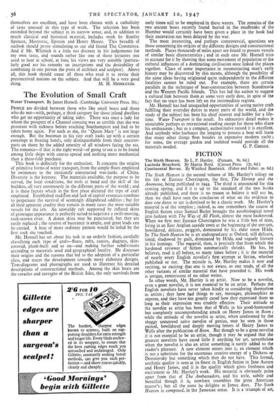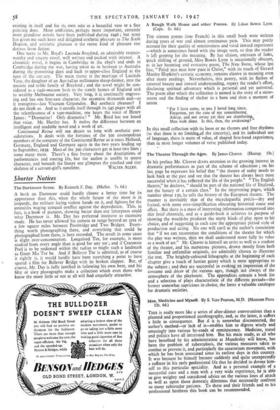FICTION Continental Revue. By Winifred Bambrick. (Faber and Faber. 9s.
6d.) The Sixth Heaven is the second volume of Mr. Hartley's trilogy on the life of Eustace Cherrington, the first, The Shrimp and the Anemone, being published in 1944. The third is announced for this corning spring, and if it is up to the standard of the two books already published, and there is no reason to believe it will not be, then we shall have seen the conclusion of what on the evidence to date one dares to say is destined to be a classic work. Mr. Hartley's material is of the simplest ; indeed, as one remembers the course of English fiction since Samuel Butler brought the autobiological novel into fashion with The Way of All Flesh, almost the most hackneyed. When we first met Eustace Cherrington he was a little boy of nine, living in an East Anglian seaside town at the beginning of the century, bewildered, delicate, priggish, dominated by his elder sister Hilda. In The Sixth Heaven he is an undergraduate at Oxford, still delicate, timid, shadowed by guilt, dominated by Hilda, and vaguely literary in his leanings. The material, then, is precisely that from which the hardened reviewer of "fiction automatically shrinks. He has, he believes, read it all before, so many times before ; it is the material of nearly every English- novelist's first attempt at fiction, whether published or not. The miracle is, Mr. Hartley makes it new and exciting, so exciting that one is not aware, as one reads, of all the other variants of similar material that have preceded it. His work is unique, reminiscent of no other writer. In other words, Mr. Hartley is an artist. Now to be a novelist, even a great novelist, it is not essential' to be an artist. Perhaps the English novelists have never taken kindly to considering themselves as artists • they have had things to say, messages, philosophies to express, and they have not greedy cared how they expressed them so long as their expression was crudely effective. Their attitude to the novelist as artist has been that of Wells in his good-humoured but completely uncomprehending attack on Henry James in Boon ; while the attitude of the novelist as artist, when confronted by the shaggy untutored naïve novelist of genius, may be seen in those pained, bewildered .and deeply moving letters of Henry James to Wells after the publication of Boon. But though to be a great novelist it is not essential to be an artist, though it may be argued that the greatest novelists have cared little it anything for art, nevertheless when the novelist is also an artist something is surely added to the reader's pleasure.. A new element enters into it, an element which is not a substitute for the enormous creative energy of a Dickens or Dostoievsky but something which they do not have. This formal, aesthetic quality is seen at its finest in English fiction in Jane Austen and Henry James, and it is the quality which gives freshness and excitement to Mr. Hartley's work. His material is obviously poles apart from that of The Ambassadors, and his style, subtle and beautiful though it is, nowhere resembles the great American master's ; but all the same he delights as James does. The Sixth Heaven is composed, in the Jamesian sense. It is a triumph of art,
existing in itself and for its own sake as a beautiful vase or a fine painting does. More amb'Aious, perhaps more important, certainly more grandiose novels have been published during 1946 ; but none has given me such keen and delighted aesthetic pleasure as The Sixth Heaven, and aesthetic pleasure is the rarest kind of pleasure one derives from fiction.
One turns to Mr. Boyd's Lucinda Brayford, an admirably respect- worthy and sincere novel, well written and packed' with interest. A chronicle novel, it begins in Cambridge in the 185o's and ends in Cambridge during the war, having taken us in between to Australia during the pioneering days and back to upper-class England at the turn of the century. The main theme is the marriage_ of Lucinda Vane, the daughter of an Australian millionaire:sheep-farmer, into the ancient and noble family of Brayford ; and the novel might be con- sidered as a wade-mecum both to the stately homes of England and to wealthy Melbourne society. Very long, it ii continually engross- ing and has one first-rate character, the eccentric thirteenth and—as it transpires—last Viscount Crittenden. But aesthetic pleasure? I do not think so. And as it unrolls itself through its 545 pages with all the relentlessness of a tape-machine, one hears the voice of Henry James: "Dramatise! Only dramatise! " Mr. Boyd has not heard that voice. Mr. Hartley has. It makes the difference between an intelligent and readable novel and a work of art.
Continental Revue will not detain us long with aesthetic con- siderations. It deals with the fortunes of the 300 cosmopolitan members of the company of the Continental Revue as it tours Holland, Germany, England and Germany again in the two years leading up to September, 1939. Most of the 30o characters get at least two lines ; some many more. There's a fine frenzy about the descriptions of performances and touring life, but the author is unable to create character, and beneath the frenzy one glimpses the pinched and tiny
skeleton of a servant-girl's novelette. WALTER ALLEN.



































 Previous page
Previous page